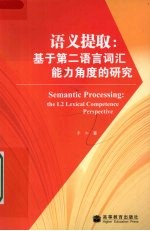

语义提取 基于第二语言词汇能力角度的研究PDF电子书下载
- 电子书积分:8 积分如何计算积分?
- 作 者:李红著(天津商业大学外语教学部)
- 出 版 社:北京:高等教育出版社
- 出版年份:2007
- ISBN:7040230968
- 页数:147 页
Chapter 1 Introduction 1
1.1 Research orientation 2
1.2 Target of research 2
1.3 Rationale and research questions 3
1.4 Definitions of key terms 5
1.4.1 Bilingual 6
1.4.2 L2 vocabulary knowledge 6
1.4.3 Conceptual and semantic processing 6
1.4.4 Working memory capacity 7
1.5 Organization of the thesis 7
Chapter 2 Literature Review 9
2.1 The bilingual mental lexicon 10
2.1.1 Organization of mental lexicon 11
2.1.2 Views of the relations between the L1 and the L2 mental lexicon 12
2.1.2.1 Independency of the L1 and the L2 mental lexicon 13
2.1.2.2 Interdependency of the L1 and the L2 mental lexicon 14
2.1.2.3 Summary 16
2.2 The revised hierarchical model 16
2.2.1 Evidence in support of the revised hierarchical model 18
2.2.2 Evidence challenging the revised hierarchical model 19
2.2.3 Evidence against the revised hierarchical model 20
2.2.4 Summary 21
2.3 Two experimental tasks in studies of mental lexicon 22
2.3.1 The primed lexical decision task and its confounding processes 22
2.3.2 Word association tasks and major findings 24
2.3.3 Summary 25
2.4 Vocabulary knowledge and measures 25
2.4.1 Breadth and depth of vocabulary knowledge 25
2.4.2 Measures of vocabulary knowledge 27
2.4.3 Summary 30
2.5 Working memory 31
2.5.1 Baddeley&Hitch's working memory model 31
2.5.2 Working memory and the central executive 32
2.5.3 Working memory capacity and language processing 33
2.5.4 Measures and construct of working memory 35
2.5.4.1 Measures of working memory 35
2.5.4.2 Unitary versus multicomponential system of working memory 37
2.5.5 Summary 39
Chapter 3 Central Ideas 41
3.1 Bilingual lexical access 42
3.1.1 Lexical access in monolingual literature 42
3.1.2 Central issues of bilingual lexical access 45
3.2 L2 lexical competence and the goal of L2 lexical development 50
3.2.1 Proposals of lexical competence in the existing literature 50
3.2.2 A tri-component framework of L2 lexical competence 53
3.2.3 The goal of L2 lexical development 58
3.3 A developmental view of bilingual processing 58
3.4 Summary 60
Chapter 4 Effects of L2 Vocabulary Knowledge 61
4.1 Experiment 1 62
4.1.1 Hypotheses and predictions 62
4.1.2 Method 63
4.1.2.1 Subjects 63
4.1.2.2 Materials 64
4.1.2.3 Procedure 66
4.1.3 Results 67
4.1.4 Discussion 71
4.1.5 Conclusion 74
4.2 Experiment 2 74
4.2.1 Hypotheses and predictions 75
4.2.2 Method 76
4.2.2.1 Subjects 76
4.2.2.2 Materials and procedure 76
4.2.2.3 Classifications 78
4.2.3 Results 83
4.2.4 Discussion 87
4.3 Summary 89
Chapter 5 Effects of Working Memory Capacity 91
5.1 Research questions 92
5.2 Method 94
5.2.1 Subjects 94
5.2.2 Materials and procedure 94
5.3 Analyses and results 96
5.3.1 ANOVA results 97
5.3.1.1 Results of the three-way ANOVA with repeated measures 98
5.3.1.2 Results of the two-way ANOVA with repeated measures for the high group 101
5.3.1.3 Results of the two-way ANOVA with repeated measures for the low group 102
5.3.2 Correlation analyses 103
5.4 Discussion 104
5.4.1 Working memory capacity,processing in a second language and L2 vocabulary knowledge 104
5.4.2 Working memory capacity and L2 vocabulary knowledge 107
5.5 Summary 108
Chapter 6 General Discussion and Conclusion 109
6.1 Discussion on the major findings 111
6.1.1 How does the development of L2 vocabulary knowledge modify access to word meanings represented in the L2 mental lexicon of Chinese learners of English? 111
6.1.2 Are there any differences in semantic and associative link patterns in the lexical networks represented in the L2 mental lexicon? 112
6.1.3 How do individual differences in working memory capacity constrain access to word meanings in the L2 mental lexicon? 114
6.1.3.1 Frequency effects in L2 semantic processing 114
6.1.3.2 Task effect of the primed lexical decision 115
6.1.4 Are there any correlations between the development of L2 vocabulary knowledge and individual differences in the working memory capacity? 115
6.1.5 Summary 116
6.2 Nature of a developing L2 mental lexicon and importance of the tri-component framework of L2 lexical competence 117
6.2.1 A developing second language mental lexicon from the perspective of L2 lexical competence 117
6.2.2 Construct of L2 lexical competence 117
6.3 Conclusion 118
6.4 Implications 119
6.4.1 Implications for the acquisition of second language vocabulary knowledge in a Chinese classroom context 119
6.4.2 Implications for the development of L2 lexical networks in a Chinese classroom context 120
6.5 Suggestions for future research 121
APPENDICES 122
REFERENCES 139
- 《汉语词汇知识与习得研究》邢红兵主编 2019
- 《法语词汇认知联想记忆法》刘莲编著 2020
- 《培智学校义务教育实验教科书教师教学用书 生活适应 二年级 上》人民教育出版社,课程教材研究所,特殊教育课程教材研究中心编著 2019
- 《《国语》和《战国策》词汇比较研究》陈长书著 2017
- 《指向核心素养 北京十一学校名师教学设计 英语 七年级 上 配人教版》周志英总主编 2019
- 《新课标背景下英语教学理论与教学活动研究》应丽君 2018
- 《大学英语教学的跨文化交际视角研究与创新发展》许丽云,刘枫,尚利明著 2020
- 《中国少数民族唢呐教学曲选》胡美玲编 2019
- 《语文阅读与写作教学研究》李玉红,陈晓玲,王芬著 2018
- 《语文教育教学实践探索》陈德收 2018
- 《全国高等中医药行业“十三五”创新教材 中医药学概论》翟华强 2019
- 《培智学校义务教育实验教科书教师教学用书 生活适应 二年级 上》人民教育出版社,课程教材研究所,特殊教育课程教材研究中心编著 2019
- 《指向核心素养 北京十一学校名师教学设计 英语 七年级 上 配人教版》周志英总主编 2019
- 《习近平总书记教育重要论述讲义》本书编写组 2020
- 《办好人民满意的教育 全国教育满意度调查报告》(中国)中国教育科学研究院 2019
- 《高等数学试题与详解》西安电子科技大学高等数学教学团队 2019
- 《北京生态环境保护》《北京环境保护丛书》编委会编著 2018
- 《教育学考研应试宝典》徐影主编 2019
- 《语文教育教学实践探索》陈德收 2018
- 《家庭音乐素养教育》刘畅 2018
